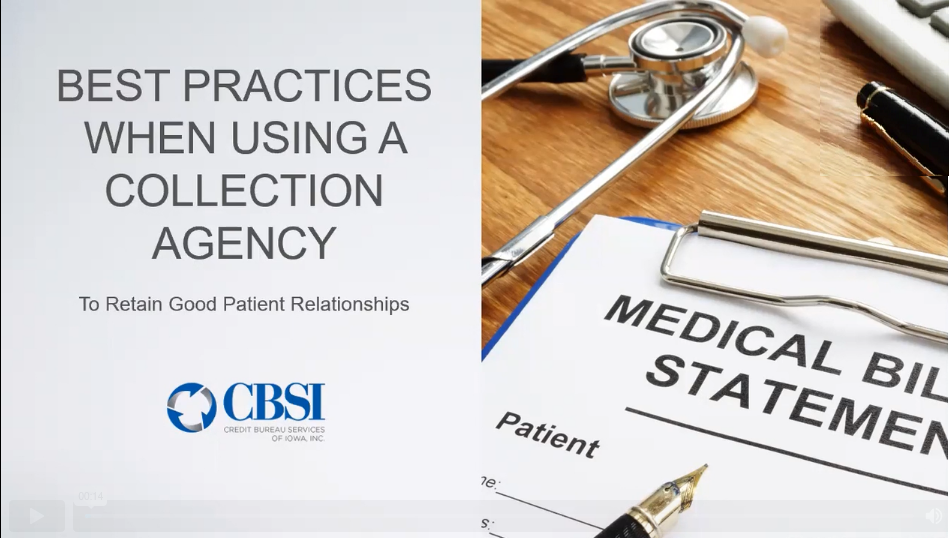Best Practices When Using a Collection Agency

CBSI Webinar Transcript
(February 19, 2020)
In healthcare, as the amount of patient self-pay increases,
maximizing the amount of self-pay collected becomes crucial.
This 30-minute webinar reviews the best practices for managing patient self-pay.
Brian Grimes:
Hello everyone!
As we all know, the amount of self-pay medical debt is rising dramatically. On average, patient pay now represents 18% of provider revenue. High-deductible health plans are on the rise, and 68% of patients under 65 have high-deductible health plans.
At CBSI, we’re seeing a dramatic rise in “registered self pay.” In other words, people without health insurance. Overall, the number of uninsured patients has increased more than 12%. This is why it’s extremely important for you to maximize the amount of self pay collected -- both on the front end and the back end.
Good morning and welcome everyone! My name is Brian Grimes and I’m the director of sales and marketing at CBSI. With me is our sales and marketing manager, Misty Little. Since 1955, CBSI has provided patient-friendly collections services, primarily for healthcare. But we do serve other industries, as well. As “the collection agency that cares,” we focus on connecting with patients, resulting in better returns while fostering genuine customer relationships.
The more work that is done up front to collect payment, the better. With increasingly more self-pay patients using your services, you need to do as much as you can to collect up front.
Pre-service pricing is the most important priority. Helping your patients understand what their costs are going to be up front, greatly increases your chances of getting paid.
Friendly and consistent communication is key. Giving your patients the feeling that you are willing to work with them, not against them will foster better relationships and will help in getting payments.
Engage early with payment options. Educating your patients on different ways payments can be made will lead to more payments.
And finally, develop an insurance discovery process. Are there any payers that should be responsible for this bill? Workman’s comp, auto insurance, Medicaid Presumptive etc. An insurance discovery solution can convert 1-5% of your uncompensated care accounts.
Having a well-trained staff on the front lines is crucial for up-front collections. It can be tough to ask for payment. Make sure to train your staff to address payment issues in a tactful manner. It’s really no different than the way we train our collectors on overdue accounts.
You need to cater your approach to the specific personality of the patient. For example, if someone is very emotional, you need to remain calm and composed. Acknowledge what the individual is saying. Show empathy but, at the same time, ask for payment.
If someone is argumentative or does not believe that they owe payment, make sure you have all your ducks in a row. Produce documents for every denial or co-pay and have this ready ahead of time. If a staff member is still not able to ask for payment after extensive training, you may need to find a better fit for the position.
Intake forms and patient contact info are key to the success of your collection agency. Make sure you’re obtaining as much info as possible on your intake forms including:
- DOB
- SSN
- Middle Initial – This is important for credit reporting. In recent years, the credit reporting agencies have tightened their requirements on credit reporting. Now if you don’t have an SSN and date of birth, a middle initial is required.
- Employment – Including phone number and address. Sometimes you can get this info from the insurance cards.
- Phone numbers are critical; include both landline and mobile numbers.
- E-mail address – Although not widely used in collections, there’s new legislation in the works providing a safe harbor for collection agencies to e-mail.
If someone is married, be sure to collect all the same information for the spouse. In the state of Iowa and several other states, both husband and wife are responsible for each other’s medical debts. Same thing goes for minor children--both parents are responsible, regardless of what the divorce decree says.
Among all the normal disclosures, make sure your intake forms grant permission to contact patients via autodial, automated messages, E-mail, and text. It does pay to engage a professional payment service provider that goes beyond just sending statements.
Misty, can you please fill us in on what to look for in payment service providers?
Misty Little:
Having multiple payment options for your patients is very important. We all like to have options and we want the payment process to be convenient. Your more traditional patients still want the ability to pay by check and mail their payment in. They need to have this option.
Online bill pay is becoming increasingly popular, especially with the millennial population. They want to be able to access their account from their computer or phone and make their payment. CBSI receives 20% of its total payment revenue online.
Acquiring credit card information and keeping it on file for payments is another way to make sure payments will be made.
Letting your patients set up a reasonable payment plan is very important. Having to pay a bill in full can be very overwhelming for some patients, which is why some just don’t pay at all. But if they know that can set up a plan that will work with their budget, they’ll be more likely to pay.
Setting up automatic payments is also a good option. Up-front collections are best. However, we all know there will be times when you need to send someone to collections.
Brian Grimes
Misty and I get asked every day, “When is the right time to send an account to collections?” Current best practices include the following:
- Once insurance has been applied (typically 30 days after service), send out the first statement.
- If no payment is received, send a past-due text, phone call or email.
- At the 60-day mark, send a past-due statement. It’s best if your past-due statement has a different look and feel from your first statement.
- Once again, if payment is not received, send a past-due text, phone call or email.
- At 90 days, send a final notice, explaining the account is being turned over to collections if not paid in “X” days. I recommend 10 days, as this creates a sense of urgency.
- If no payment received, collection agency should come into play at 120 days past due.
A lot of agencies push to send your accounts at the 30- to 60-day mark. However, I think this is too soon. Patient relationships are a concern and obviously so are commissions.
However, if someone is not willing to pay after three statements and 120 days, the statistics show you’ll end up with more in your pocket by sending the account to collections than continuing to send statements.
Of course, there will be situations where you’re waiting on insurance. However, if you’re going past six months, it’s going to cost you--bad debt is very time sensitive.
- Once accounts are placed in collections, we then verify addresses with the USPS.
- Scrub for bankruptcies and deceased.
- Score each account based off collectability .
- Accounts are then grouped with any other existing accounts in our database. Currently, this happens 90% of the time.
- Then send out a validation notice. The law requires that consumers be given 30 days to dispute a debt.
- Each letter has a link to our online payment negotiator to set up payment plans.
- Next the collection calls start.
- Credit reporting after 60 days.
- Legal recourse begins after regular efforts are exhausted.
Misty will now talk about what to look for in a collection agency.
Misty Little:
There are several things you should look for when considering a collection agency. Make sure you do your homework.
The location or market worked is very important. You want to make sure the agency you use works your market. Having a local database of patient contact information is extremely important for collections. National agencies just aren’t able to return as much money to you, because they don’t have the local contact information.
Using an agency that actively works your market gives them the ability to combine efforts, because they’re working with that same consumer who has debts with other local clients. So a local agency can use all the data collected to understand the collectability of an account, because they already have a relationship with that individual. The agency can also combine the accounts for that individual, which will equal a larger amount owed in total and ensures the account will be worked and revisited several times to collect payment.
You’ll also want to ask the agency about their license. Many states do require a collection license or bond. Make sure the agency you decide to use has the correct credentials for your state or partners with an agency that does.
Does the agency pursue legal action? Legal recourse is an option that works well in some states, but not all. For CBSI, it’s a last resort after all regular collection efforts have been exhausted. We only pursue legal action on accounts where we’ve been unsuccessful in collecting through regular efforts and we’ve verified that the individual is gainfully employed, and has the ability to pay but is choosing not to. Once legal recourse has been pursued, we can garnish wages to collect the debt. The garnishment process is actually rather consume-friendly, as it does not drain the patient’s paycheck and only lasts a maximum of 120 days.
Beware of agencies that send accounts to legal right away, within 30-60 days of receiving the account. This is a tactic that less reputable agencies will use to charge you a higher rate. They’ll also sometimes send a letter to your patient, threatening legal action but then never follow through with it. This practice is illegal.
ACA membership is also something to ask about. The Association of Credit and Collection Professionals establishes ethical standards for collection agencies. Compliance and regulation are first and foremost. ACA members have access to the latest industry changes and information to stay compliant. An agency that is active in its local state ACA chapter is a good sign of a reputable agency. Compliance is extremely important. Your agency must be compliant with the FDCPA (Fair Debt Collection Practices Act), as well as all state and federal regulations. Ask if they have a compliance system in place and how they handle disputes.
Longevity of the agency is also important. There are some fly-by-night agencies that come and go in our industry. Make sure your agency of choice has experience and good financial standing.
BBB – Better Business Bureau rating. Research the agency’s BBB rating. Yes, individuals will complain to the BBB just to try and get out of legitimate debts owed, but make sure your agency is responding to the complaints and does not have an unusually low rating. Using an agency who utilizes a HIPPA Compliant Online Portal is also something to look for. It’s helpful for you and your staff, as you can check on your accounts, run reports and communicate securely. It’s also a great tool for your patients, so they can make online payments to pay in full or negotiate a payment plan.
Collections approach – Make sure the agency you choose has a patient-friendly approach. Working with your patients in a caring, empathetic manner will get more results than harsh demands. Being friendly, understanding and compassionate will lead to higher returns in the long run and fewer complaints.
Brian Grimes:
One of the most important things to remember about choosing a collection agency is to not just go for the low rate. Most agencies work on a contingency basis, but a lower contingency rate is not always best for your business. Agencies who offer unusually low rates do not put the work needed into collecting the accounts. They may make one or two phone calls and give up. You want to focus on the amount of Net Dollars Returned an agency can get for you. Even with a higher contingency rate, the agencies that put in the work to collect on your accounts will recover more money in the end, which is better for you in the long run.
To determine an accurate return percentage for your agency, simply take the dollar amount they have returned divided by the total dollar amount you have placed with them. This factors in the contingency rate while focusing on the true dollars they were able to recovery for you. Lower contingency rate does not always equal savings or more money back in your pocket.
At this time, we’ll open it up for any questions you might have.
Questions:
HOW MUCH WILL YOUR SERVICES COST ME?
Many collection agencies, like CBSI, charge on a percentage based on the amount they collect, also known as a contingency fee. This fee will most likely be based on the age and volume of your receivables and will be determined after gathering more information specific to your practice/business.
HOW WILL MY PATIENTS / CUSTOMERS BE TREATED?
It’s important that the agency of your choice realizes that, although you’re owed money, you have a reputation to maintain and would like to keep a working relationship with the customer. For this reason, you want an agency that truly cares about that relationship. The collectors must be professional and helpful, as well as tactful, when speaking to your customers--never harassing or belligerent. At CBSI, we believe that being “Iowa Nice” is the right way to treat people.
HOW WILL I KNOW THE STATUS OF MY ACCOUNTS?
Your agency should provide you with monthly statements, as well as access to progress reports on your accounts. CBSI offers a user-friendly online web portal for our clients to run reports and view all activity on their accounts 24 hours a day, seven days a week. At CBSI, you can also call or email our office during normal business hours and speak to our highly skilled customer service team for updates.
WHAT IF MY MAIL IS BEING RETURNED AND WE DON’T HAVE ANOTHER ADDRESS?
A good agency should utilize “skip-tracing.” Skip-tracing utilizes state-of-the-art technology to locate consumers that have moved from their previously known address. There are many means available to an agency to skip trace, such as certain paid software programs, as well as the Dept. of Motor Vehicles, the internet, the credit bureaus or merely fishing around. A good skip tracer is like a detective; they’re rewarded when they find their subject. Also, 90% of the time, that name that you send us is already in our system, because they owe other people money as well. We have lots of ways to find updated information.
WHAT IS THE MINIMUM DOLLAR AMOUNT THAT IS WORTH SENDING TO CBSI?
Our minimum placement dollar amount is $20 typically. That would be if you had multiple accounts, maybe several small co-pays with a total of $20.
ON AVERAGE, WHAT IS THE PERCENTAGE OF ALL ACCOUNTS PLACED WITH YOU THAT ARE COLLECTED IN FULL WITHIN SIX MONTHS?
It would totally depend on how much work the client has put into the accounts, how old they are, the average balance, location, etc. In a perfect world, the industry average return rate is about 18%, and that's over the course of several years. The six-month range would be considerably lower, ranging from 5%-7% to 12%-15%. Our ultimate goal is to return about 30%, where the industry average is about 18%.
WHAT IS YOUR PROCESS FOR ACCOUNT PLACEMENTS FROM PROVIDERS? ARE WE ABLE TO UPLOAD A SPREADSHEET TO YOUR PORTAL?
Our client access web system gives you the option of uploading your own spreadsheet to our portal. We also have a form on there that you can fill out, if you're just placing one or two accounts. If you have multiple accounts, you can definitely upload a spreadsheet. We just ask that as much information as possible be included on the spreadsheet.
DOES CBSI PRIORITIZE THE ACCOUNTS BASED ON THE AGE OF THE PAST-DUE BALANCE?
That is part of it. Our system uses a whole scoring methodology based on age, collectibility, balance, patient's financial status, and our own experience with that individual.
WHEN SOMEONE SETS UP A PAYMENT PLAN, AND THEN DEFAULTS ON THAT PLAN, WHAT IS YOUR PROCESS FOR CONTINUING TO TRY TO COLLECT ON THE ACCOUNT?
That account stays in our regular collection efforts. We'll start calling and sending letters again. If there's still no payment, then we'll report it to the credit bureaus. If it's a high enough balance, we may pursue legal action. After that, they won't have the option, because we'll garnish wages.
IS THERE A MINIMUM BALANCE FOR YOU TO PURSUE LEGALLY?
Typically, it's about $500 or $600 owed to our agency. But that doesn't mean that your $20 or $50 account won't be pursued through Legal. Through right of assignment, we can assign all those debts over to the credit bureau from multiple clients being owed. We then can pursue one small claims court judgment, with all the parties included.
IS THERE A STATUE OF LIMITATIONS ON COLLECTING A DEBT?
In Iowa, the statute of limitations to pursue legal action is five years based off the last date of activity (e.g., service date, payment, etc.). There is no statute of limitations to pursue the debt through other means in the state of Iowa. It is always collectible, regardless of age. It's just the window to pursue legal action and credit reporting does have that limitation. And that statute can vary from state to state.
CAN LATE CHARGES / SERVICE CHARGES BE INCLUDED IN THE PATIENT'S DEFAULT PAYMENT BALANCE FOR CBSI TO PURSUE FOR A CLIENT?
That's definitely a possibility. We usually suggest that that be done on your end first. Once you send the bill over to us, we like for it to be the final amount owed by the patient, so the amount isn't changing. We also suggest you put some sort of disclosure statement on your patient intake form or your patient financial responsibility form that says they will be charged late fees or collection fees in the event of non-payment.
DOES THE DEBT STAY ON A PERSON'S CREDIT REPORT FOREVER, OR JUST UNTIL THE DEBT IS PAID OFF?
It basically stays on the credit report for seven years. But the credit bureaus want us to remove anything that's been paid by insurance. And for the most part, anything that is paid, we are removing. If it hasn't been paid, after the seven-year mark, it's completely gone. For patients who are curious about their credit reports, go to annualcreditreport.com.
IF WE HAVE SENT AN ACCOUNT TO COLLECTIONS, AND THE AMOUNT DUE IS WRITTEN OFF AT THE END OF THE YEAR, AND CBSI IS UNSUCCESSFUL IN COLLECTING IT, IS IT LEGAL TO ASK THE PATIENT TO PAY IN FULL THE COLLECTION AMOUNT BEFORE SETTING UP ANOTHER APPOINTMENT FOR THEM?
I'm not an attorney, but we have clients all the time who require patients to pay collection accounts in order to receive further services. Hospital accounts are a different story with regard to what they can or cannot turn down. But on the clinic side, that usually is the case, and I recommend it.
Recent Posts











Share On: